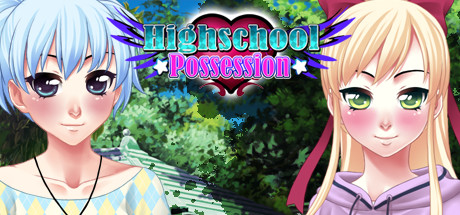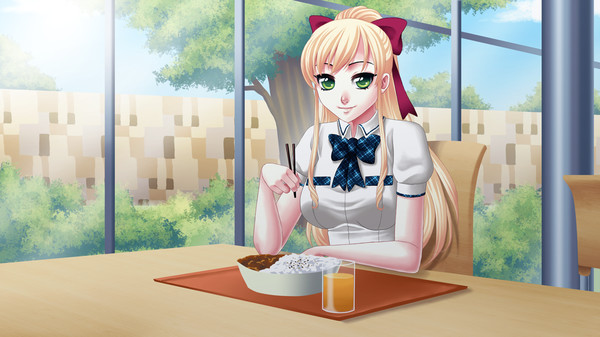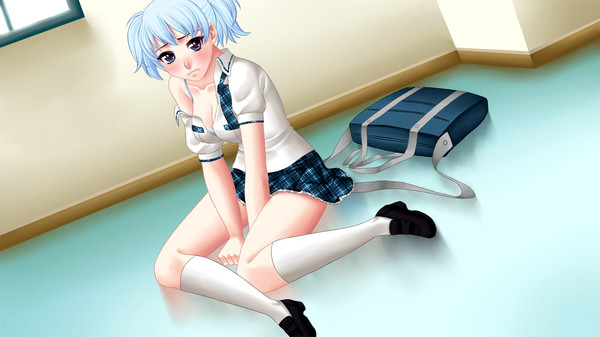Communication Theories in Katawa Shoujo:
Katawa Shoujo is a visual novel game about a high school boy named Hisao Nakai in Japan. After developing a heart condition (arrhythmia), he’s transferred to Yamaku Academy, a school for students with disabilities. As he adjusts to his new life, Hisao meets five girls, each with their own experiences of disability and unique way of communicating. Through these relationships, Hisao not only explores romance but also learns to adapt to disability culture — and each girl’s story represents a different communication theory that helps him do so. The player also meets Kenji, a paranoid, legally blind student who lives across the hall. Though his over-the-top conspiracy theories and isolation from the rest of Yamaku make him an unforgettable character, his story ends early and doesn’t follow the same structure as the others. Because of that, while he deserves a mention, he won’t be discussed in detail here.
The game’s story structure follows a pattern of culture shock. Hisao leaves behind his old way of life and enters disability culture at Yamaku. “Only after I stand in front of the haughty main building, I surprise myself by realizing why the gate bothered me: it was my last chance to turn back, even if I had no life I could ever return to.”
Dr. Igor Klyukanov outlines five stages of culture shock in Principles of Intercultural Communication, which we can see reflected in Katawa Shoujo:
1. Preliminary and Spectator Phase – Hisao’s early days at Yamaku, where he passively observes the new environment but doesn’t yet understand it. He wonders if he will ever have a “normal” life again.
2. Increasing Participation Phase – As he interacts with the students, he starts questioning his old perspectives. He wonders, “Will I ever get used to sights such as this?” and, “Is this what passes for normal around here?”
3. Shock Phase – A turning point in Hisao’s journey, depending on the route taken. This is the emotional crisis where he must either accept his new reality or struggle against it.
4. Adaptation Phase – If he successfully navigates the shock, he reaches a point where disability is no longer foreign. He is able to exist in and out of the culture at the same time, accepting both his past and present selves.
Each girl Hisao meets serves as a guide, embodying a different communication theory that helps him through this adaptation process.
Shizune and Misha – Social Influence Theory
Shizune, a strong-willed deaf student and class representative, communicates through her interpreter, Misha. Misha’s loud, bubbly personality contrasts with Shizune’s serious and competitive nature, creating a comedic yet dynamic relationship between the three. Their story aligns with Social Influence Theory (French and Raven, 1959), which suggests that relationships develop through shifts in power, influence, and persuasion. From the start, Shizune wants to draw Hisao into her world, challenging him through student council work and games. She believes: “The mark of great people is that they are daring and can follow through.” She wants to make Hisao stronger by encouraging him to take on leadership roles. In her good ending, Hisao embraces this influence, realizing that Shizune was never trying to control him—she just wanted to connect. In her bad ending, the power dynamic collapses. When Hisao and Misha’s hidden relationship is exposed, Shizune loses trust in both, and Hisao becomes isolated. Since Shizune views love and life as all-or-nothing competitions, there is no neutral ending.
Hanako – Uncertainty Reduction Theory
Hanako, a shy burn victim who avoids attention, struggles with social anxiety and self-worth. Her story follows Uncertainty Reduction Theory (Berger and Calabrese, 1975), which states that as people interact, they seek to reduce uncertainty about one another. When successful, this leads to increased intimacy and trust. At first, Hanako barely speaks to Hisao, often relying on her best friend, Lilly, for comfort. But as Hisao shares his own struggles, she begins reciprocating. “I-I have to,” she says when explaining her past, indicating her need to balance the information she’s given and received. In her good ending, she fully opens up, allowing Hisao to see her scars and returning his affection. In her neutral ending, they remain stagnant, both agreeing to “stay the same,” preventing further connection. In her bad ending, she retreats completely, rejecting Hisao in a final outburst: “I hate Lilly! I hate you most of all! I know I’m broken!”—a full breakdown in uncertainty reduction.
Lilly – Principled Negotiation Theory
Lilly, a blind and kind-hearted girl, navigates relationships with a sense of fairness and compromise, making her story fit Principled Negotiation Theory (Ury and Fisher, 1981). This theory emphasizes agreements that satisfy both parties’ interests in a balanced, lasting way. Unlike Shizune, who views conflict as a challenge, Lilly avoids unnecessary confrontation, focusing on harmony. She even accommodates Shizune, her rival, saying, “Please, Hisao, it’s alright,” when he tries to defend her. In her good ending, Lilly stays in Japan, choosing her relationship with Hisao over moving to Scotland. The agreement is fair and mutual. In her neutral ending, she leaves, but encourages Hisao to follow his own dreams, showing wisdom but forfeiting their relationship. Because she has an older sister to care for her, she has no bad ending.
Rin – Redefinition Theory
Rin, an eccentric painter born without arms, often struggles to express herself. Her story follows Redefinition Theory (Braithwaite, 1990), which argues that people with disabilities challenge societal definitions and create new identities for themselves. Rin doesn’t see herself as limited: “I don’t think I’m that disabled. I mean, I do pretty much everything differently. But it’s not that hard. I can always practice.” She adapts effortlessly, seeing disability as a part of her identity rather than a restriction. Hisao, however, initially struggles to understand her. When he tries to “fix” her or make sense of her abstract thoughts, their relationship fractures. “I think in the end, I’m not really happy with who I am, either. But that doesn’t mean that I regret being who I am. That’s the thing that’s wrong with you, Hisao.” In her good ending, Hisao accepts that Rin doesn’t need fixing, and their relationship becomes one of mutual understanding. In her neutral and bad endings, he fails to see her as she is, causing her to withdraw completely.
Conclusion
Katawa Shoujo is more than just a dating sim. It’s ultimately about Hisao’s journey of adaptation and self-discovery within disability culture. Each girl represents a communication theory that helps him move through the phases of culture shock, from uncertainty to acceptance. Through these experiences, Hisao—and by extension, the player—comes to see disability not as an obstacle, but simply another way of being.
Bibliography
Berger, C.R., and Calabrese, R.J. (1975). Some explorations in initial interaction and beyond: Toward a developmental theory of interpersonal communication. Human Communication Research, 1(2), 99-112.
Braithwaite, D.O. (1990). From the Margins to the Center: An Intercultural Redefinition of Disability. Text and Performance Quarterly, 10(1), 7-21.
French, J.R.P., and Raven, B. (1959). The bases of social power. In Cartwright, D. (Ed.), Studies in Social Power. Ann Arbor, MI: Institute for Social Research.
Klyukanov, I. (2005). Principles of Intercultural Communication. Boston: Pearson.
Ury, W., and Fisher, R. (1981). Getting to Yes: Negotiating Agreement Without Giving In. New York: Penguin Books.















































